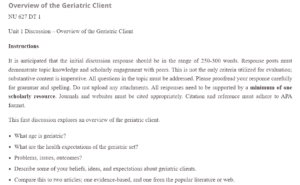Overview of the Geriatric Client
What age is geriatric?
Geriatric refers to the care of patients in the older age group, often described as those above 65 years of age.
What are the health expectations of the geriatric set?
According to Alejandro et al. (2017), most geriatric patients prefer to get their healthcare needs met in a hospital setting instead of other options, such as having a nurse at home. Additionally, they prefer to be informed about their health conditions and allowed to make their own decisions regarding the type of care they would like to have.
Problems, issues, outcomes?
Older adults face a number of challenges, and these include chronic health conditions such as diabetes, cancer, and heart disease, among others. Obesity has been shown to be a major contributing factor to these conditions. Another challenge is the loss of cognition, with the most common being dementia. Mental health, especially depression, is another issue. There is also physical injury contributed by osteoarthritis and osteoporosis. Sensory impairments, poor oral health, and malnutrition are other health problems. All these challenges and issues result in a poor quality of life and increased healthcare costs for an individual and the healthcare system as well (Yellowitz, 2015).
Describe some of your beliefs, ideas, and expectations about geriatric clients
I believe geriatric patients need to access care if it improves their lives. However, if a patient is elderly and has a chronic disease, such as cancer, with a poor prognosis, such a patient should not be subjected to intensive medical treatment. Chemotherapy on an elderly patient who will eventually die is, in my opinion, an unnecessary evil to the patient and a strain on already scarce resources both for the patient and the healthcare system.
Compare this to two articles; one evidence-based, and one from the popular literature or web
According to Estapé (2018), treatments for cancer may have devastating effects on elderly patients. Additionally, some treatments may counter-act with other treatments that the elderly may be receiving for other diseases. The cancer centre’s webpage advises that oncologists need to weigh the pros against the cons when it comes to cancer treatment for the elderly.
Draw conclusions and set expectations for this course.
Treatment of geriatric patients needs to be done after careful considerations are made on the positives and negatives of the said treatment. Elderly patients often have co-existing conditions, and the treatment of one can negatively affect the treatment of another. I hope this course will give me more information on how to treat patients with their best interests at heart and not for the sake of doing the expected thing.
References
Alejandro, R.O.; Ariadna, G.S; Lorenzo, R.J; and David, C.R. (2017). . Preferences and expectations of the older adult care. Arch Gen Intern Med. 1(3):1-2
Estapé, T. (2018). Cancer in the elderly: challenges and barriers. Asia-Pacific journal of oncology nursing, 5(1), 40.
Yellowitz, J. A. (2015). Geriatric health and functional issues. The ADA practical guide to patients with medical conditions, 405-422.
ORDER A PLAGIARISM-FREE PAPER HERE
We’ll write everything from scratch
Question 
Overview of the Geriatric Client
NU 627 DT 1
Unit 1 Discussion – Overview of the Geriatric Client
Instructions
It is anticipated that the initial discussion response should be in the range of 250-300 words. Response posts must demonstrate topic knowledge and scholarly engagement with peers. This is not the only criteria utilized for evaluation; substantive content is imperative. All questions in the topic must be addressed. Please proofread your response carefully for grammar and spelling. Do not upload any attachments. All responses need to be supported by a minimum of one scholarly resource. Journals and websites must be cited appropriately. Citation and reference must adhere to APA format.

Overview of the Geriatric Client
This first discussion explores an overview of the geriatric client.
- What age is geriatric?
- What are the health expectations of the geriatric set?
- Problems, issues, outcomes?
- Describe some of your beliefs, ideas, and expectations about geriatric clients.
- Compare this to two articles; one evidence-based, and one from the popular literature or web.
- Draw conclusions and set expectations for this course.
Responses need to address all components of the question, demonstrate critical thinking and analysis and include peer-reviewed journal evidence to support the student’s position.
Please be sure to validate your opinions and ideas with citations and references in APA format.